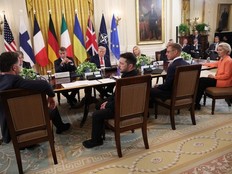Carney announces $1.2 billion in support measures for softwood lumber industry
The move comes as the U.S. ratchets up duties on Canadian softwood lumber as bilateral trade tensions rise.

Article content
Ottawa’s announcement Tuesday of a $1.2 billion bailout for the forestry sector drew cautious applause from members of the industry in B.C., who said there is more to do to get producers back on their feet as the U.S. increases import duties on softwood lumber.
Brian Menzies, executive director of the Independent Wood Processors Association of B.C., says he welcomes the financial support from Ottawa but stressed that reaching a new trade deal with the United States, including an agreement to lower or remove the 27.3 per cent duties placed on Canadian softwood lumber imports, is critical to the industry’s survival.
Menzies says he expects countervailing duties to be announced in the next week or so that would raise total duties to around 35 per cent.
“The problem right now is that over eight years now of posting bonds, these companies are stretched. It’s hard for them to find any more collateral to basically back their guarantee to the United States,” said Menzies.
“In a lot of cases, these people have made guarantees on their personal homes, not just their businesses, on their personal homes, to be able to do this.”
The recent increases have been made retroactive to 2023, which Menzies says further risks causing many smaller companies in the wood products sector to collapse.
Prime Minister Mark Carney made Tuesday’s announcement in West Kelowna and said $700 million of the $1.2 billion will go toward loan guarantees to help companies restructure operations while the remaining $500 million will be used to help them develop new products and diversify their markets.
He added that a further $50 million will be spent on programs to help retrain workers who end up losing their jobs as a result of the challenges facing the softwood industry.
“At this hinge moment in history, Canada is starting to shift from reliance to resilience,” Carney said, acknowledging that 90 per cent of Canadian timber exports currently go to the United States. “Together we are going to write our own story, rather than let others dictate theirs to us.”
To help reduce that reliance on the United States, Carney said Ottawa will prioritize the use of Canadian lumber as part of his signature Build Canada Homes Plan, which seeks to build 500,000 homes annually over the next 10 years.
Kim Haakstad, CEO of the B.C. Council of Forest Industries, said she is glad to see the federal government step up to help alleviate some of the challenges caused by American duties but also wants to see the province do its part to ensure the B.C. forestry sector remains competitive within Canada.
“We need to solve the things in our control, which is to stop managing the decline and get the B.C. forest industry more competitive,” said Haakstad, pointing to Premier David Eby’s promise to provide producers with 45 million cubic metres of fibre annually.
Forests Minister Ravi Parmar told Postmedia on Tuesday that making sure softwood lumber is included in any eventual trade deal with the United States is a top priority.
He said he expects B.C. to receive $500 million of the $1.2 billion from Ottawa given the province produces around one-third of Canada’s total softwood lumber.
“Is it everything we need? No, but it’s a start, and I recognize that, and I’m certainly looking forward to working with (the federal government) to ensure we get our fair share of funding,” said Parmar.
“I think it’s fair to say that we will be expecting at least half of those funding dollars in the form of liquidity and capital dollars, around 500 million, to be coming to British Columbia, just in recognition of how critical forestry is to our economy and the fact that we are the largest province with a stake in forestry in the entire country.”
He touted his government’s efforts to help the sector in recent years, despite facing challenges with pine beetles, forest fires and a declining timber supply, with 80 per cent of permits now being issued within 25 days.
Conservative Leader John Rustad, however, disputed Parmar’s statement about permitting and said that not only have the NDP done little to help the forestry sector, they have helped contribute to its decline through the charging of high stumpage fees and permit delays.
“The problem is, when you aren’t issuing permits, you’re not issuing fibre. For example, this government has come out and greatly touted this past winter that their target is 45 million cubic meters in our forest sector. Their own budget numbers only counted for 32 million,” he said.
Rustad wants to see the stumpage system scrapped all together in favour of a value-added tax that would encourage companies to extract as much value as they can from the wood they are provided in exchange for lower fees.
Brian Frenkel, a Vanderhoof district councillor and member of the three-person team in charge of reviewing B.C. Timber Sales, said some recommendations for addressing the challenges with the current system were put on Parmar’s desk for review on July 15.
“The report’s in to the minister, but we want to be able to say, ‘OK, this is what we can do in short term, long midterm and long term.’ And so their team’s looking at that,” he said.
“In British Columbia, I don’t think we’re going to have the megamills anymore. We’ve gone through the pine beetle. And I think you know we need to look at how we look at the remaining, if you want to call them, survivors can Succeed. How do we do that?”













Postmedia is committed to maintaining a lively but civil forum for discussion. Please keep comments relevant and respectful. Comments may take up to an hour to appear on the site. You will receive an email if there is a reply to your comment, an update to a thread you follow or if a user you follow comments. Visit our Community Guidelines for more information.